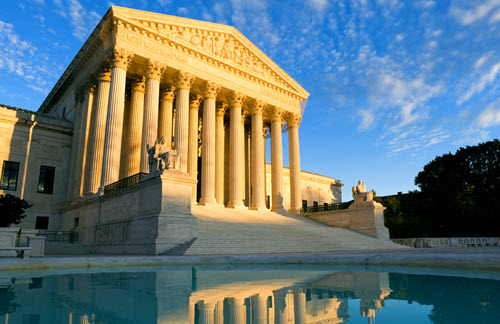By: Cole Bauman | Summer Intern | cole.bauman@procopio.com

The U.S. Supreme Court was expected to publish its decision in Carpenter v. Murphy yesterday, but instead scheduled the case for reargument during the Court’s next term. As we mentioned in our post on the Court’s May decision of Herrera v. Wyoming, the Court in Carpenter must decide whether half of Oklahoma has remained an Indian reservation since 1866. More specifically, the question presented in Carpenter is whether the 1866 territorial boundaries of the Creek Nation within the former Indian Territory of eastern Oklahoma constitute an “Indian reservation” under 18 U.S.C. § 1151(a)? Apparently, the Supreme Court needs more time to determine the answer.
Although a rarity for the Court, rearguments have been ordered in the past. Carpenter joins such landmark cases as Brown v. Board of Education (argued in 1952, reargued in 1953), Roe v. Wade (argued in 1971, reargued in 1972), and Citizens United v. Federal Election Commission (argued twice in 2009), among others. Each of these cases caused quite a stir, and in Carpenter, there is a lot at stake.
In 1866, Congress established reservations for the Muscogee (Creek), Cherokee, Chickasaw, Choctaw, and Seminole Nations. These reservations predate Oklahoma’s statehood, which occurred in 1907. In August of 2017, the 10th Circuit held the state of Oklahoma lacks jurisdiction to prosecute Mr. Patrick Dwayne Murphy, a member of the Creek Nation who was convicted of murder in Oklahoma state court, because it found Congress never disestablished the 1866 boundaries of the Creek Nation. When major crimes such as murder are alleged to have occurred within the boundaries of an Indian reservation, the federal government, not the state, has jurisdiction under the Major Crimes Act.
Following its decision, the 10th Circuit denied an en banc rehearing of Carpenter, stating an en banc rehearing is inappropriate when “as here, a panel opinion faithfully applies Supreme Court precedent.” However, Supreme Court review of the decision is complicated due to Justice Gorsuch’s recusal from the case. Gorsuch’s absence has caused an apparent stalemate in the Court which could result in a 4-4 decision, ultimately affirming the 10th Circuit’s holding that the Creek Reservation was never disestablished. It could be that the conservative court is trying to avoid such a deadlock non-decision.
From the outside looking in, a concern of a status quo result upholding the 10th Circuit appears to be the crux of the delay in deciding Carpenter. In Carpenter, Supreme Court precedent dictates the application of the Solem v. Bartlett reservation diminishment test. In Solem v. Bartlett, the Supreme Court applied a three-part framework for assessing whether a reservation has been diminished. Under the test, a court must first examine the text of a statute that is believed to disestablish or diminish the reservation. Second, the court must consider the events surrounding the passage of the statute. Third, the court must consider, to a lesser extent, the events that occurred after the passage of the statute. The 10th Circuit’s application of this test found Congress had not disestablished the Creek Reservation.
The Supreme Court would require some very creative legal gymnastics to avoid agreeing with the 10th Circuit’s application of the Solem v. Bartlett test. Certainly, the refusal to issue an opinion this term is telling. The Court previewed its quandary on December 4th, 2018, one week following the oral arguments for Carpenter, when the Supreme Court requested additional briefing on the matter, asking for answers to two questions: (1) whether any statute grants Oklahoma jurisdiction over crimes committed by Indians, irrespective of the reservation status of the land, and (2) whether land can be part of an Indian reservation but not considered Indian country under 18 U.S.C. § 1151(a). The request indicates the Supreme Court was searching for a way to resolve the case in favor of Carpenter without overturning its own precedent in deciding how and when reservation diminishment occurs. The order for reargument indicates such a solution did not materialize.
The Supreme Court is right to carefully consider the ramifications of upholding the 10th Circuit’s decision, but setting the Solem v. Barlett test aside or finding a loophole to avoid addressing the question of diminishment would be a crushing blow to Native American treaty rights and tribal sovereignty. It would demonstrate that the Supreme Court is willing to set aside the foundations of federal Indian law and usurp the role of Congress to avoid what it sees as inconvenient jurisdictional results. Perhaps more unsettling, though, it would display a prejudicial belief by the justices that Indian nations are unfit to possess such jurisdiction.
For updates on Carpenter v. Murphy when the Supreme Court reconvenes next term, subscribe to Bloggingcircle.

Cole Bauman is a Procopio Summer Intern and a member of the Red Cliff Band of Lake Superior Chippewa. He recently completed his second year at the Sandra Day O’Connor College of Law at Arizona State University, where he served on the Executive Board of the ASU Moot Court.

Ted Griswold is head of Procopio’s Native American Law Practice Group and primary editor for the Blogging Circle. Connect with Ted at ted.griswold@procopio.com and 619.515.3277.




